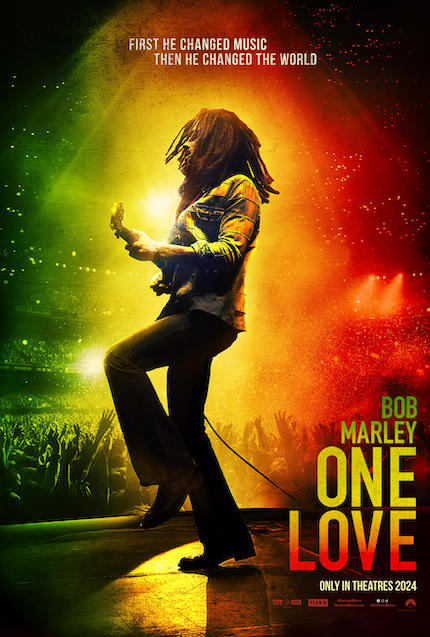BOB MARLEY: ONE LOVE Review: Conventional Biopic for Unconventional Musical Genius

Whenever the famous son of a famous singer, songwriter, and musician appears onscreen to extoll the authenticity of his late, revered father’s biopic, largely thanks to his family’s intimate involvement in every aspect of production, there’s a better-than-average chance that hagiography and not biography will follow moments later.
And hagiography is what, in fact, co-writer and director Reinaldo Marcus Green (King Richard, We Own This City, Monsters and Men) earnestly delivers with Bob Marley: One Love, an edge-free, family-approved biopic of one of the greatest — and easily one of the most popular — musical artists of the last 50 years.
Rather than the cradle-to-grave approach of old-school biopics, Bob Marley: One Love focuses on the critical six-year period that ended with Marley’s untimely death at 36 due to a rare form of skin cancer. Green also intersperses occasional, surface-deep scenes of a teenaged Marley (Quan-Dajai Henriques) and his future wife, Rita (Nia Ashi), as they start a two-decade romantic and musical relationship, along with what appear to be nightmares of a preteen Marley, a field on fire, and a man on a horse. Unfortunately, both sets of scenes feel superfluous, adding little, if anything, narratively or thematically.
Most of the film, however, covers an adult Marley (Kingsley Ben-Adir, One Night in Miami’s Malcolm X) as he navigates a turbulent, violent era in Jamaican history. A romantic idealist who sees music, specifically his music, as a means to unite disparate, contradictory elements in Jamaican society, an already popular Marley agrees to headline a “Free Jamaica” concert meant to unify Jamaicans and transcend political divisions. Avowedly apolitical, but as a public figure, nonetheless political, Marley’s decision makes him the target of the vicious, violent gangs that dominate politics in 70s-era Jamaica.
After narrowly avoiding an assassination attempt in his home that leaves him wounded and his manager in critical condition, Marley sends his family, including Rita (Lashana Lynch), like Marley a survivor of the attack, to the U.S., where their relative safety can be guaranteed. Marley and his band relocate to London, ostensibly to begin recording the album Exodus, which would become the biggest hit in his career. With Marley’s fame and popularity growing in leaps and bounds, Green uses Rita’s semi-welcome return to expose the fissures and fractures in their relationship.
The London-set scenes between Marley and Rita come as a surprise, mostly because Green, obviously working within specific parameters set by Marley’s surviving family, has spent the previous hour and change sidestepping the thornier aspects of Marley’s personal life, like the children fathered by Marley outside of his marriage to Rita that she both openly acknowledges and also raises as her own. And it’s never mentioned again. Likewise, the mute women who hover in the background are vaguely linked to Marley romantically.
Given the safe, anodyne, ultimately conventional approach Green takes to depicting the final years of Marley’s eventful life, the messy, conflict-ridden Marley-Rita street scene feels like it belongs in an entirely different film altogether. With a screenplay credited to four writers, including Green and Boardwalk Empire creator Terence Winter, and the family’s above-the-line involvement in the production, it’s the first and last scene that feels uncommonly raw and authentic, providing audiences with a small measure of insight into the real Marley and Rita.
Though buoyed by a finely attuned cast led by Ben-Adir and Lynch as Bob and Rita, respectively, those same audiences will feel cheated by the last, conflict-free half-hour of Bob Marley: One Love. Green and Ben-Adir’s Marley, driven by his utopian ideals and spiritual beliefs (Rastafarianism), becomes a near saintly figure, devoid of hesitation, reservation, or doubt, self-directed or otherwise, a figure worthy of secular worship and indisputable adulation.
Luckily for everyone involved (e.g., Green, the production, and, of course, the audience), Marley’s music, his songwriting gifts, and his unique vocal style remain as sonically striking and profoundly memorable as they did when Bob Marley and the Wailers introduced the world outside Jamaica’s coastline to reggae. Green smartly sprinkles Marley’s greatest, best-known hits throughout the soundtrack, occasionally showing the fictional Marley writing songs and lyrics or performing them to hypnotically enthralled audiences.
Bob Marley: One Love opens today, only in movie theaters, via Paramount Pictures.
Bob Marley: One Love
Director(s)
- Reinaldo Marcus Green
Writer(s)
- Terence Winter
- Frank E. Flowers
- Zach Baylin
Cast
- Kingsley Ben-Adir
- James Norton
- Lashana Lynch







